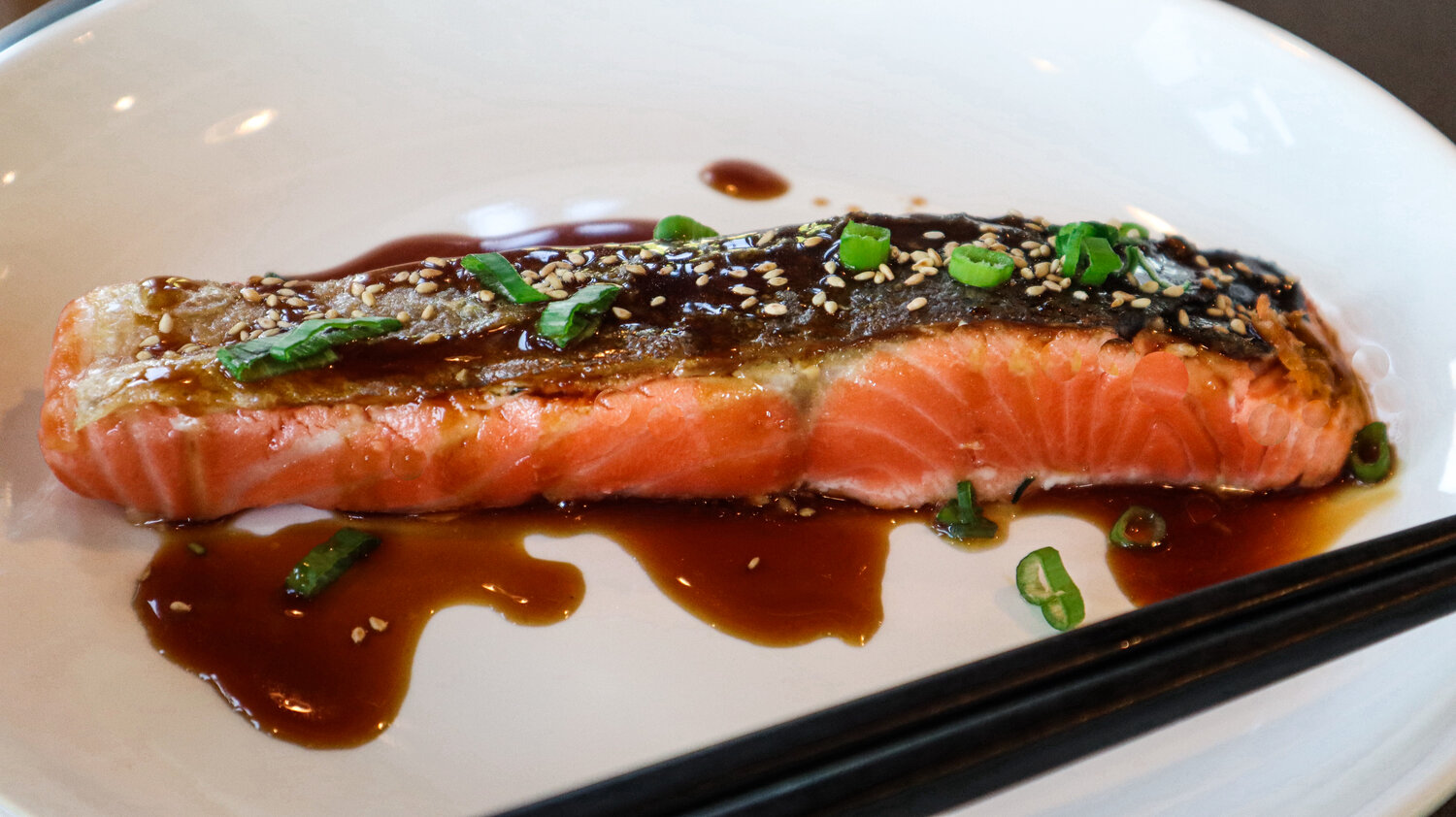Take an additional 20% Off! Use discount code “david” at check out
![Salmon Confit with Ginger Scallion [Cá Hồi Om Dầu Olive] Salmon Confit with Ginger Scallion [Cá Hồi Om Dầu Olive]](https://i.imgur.com/1l2MYqr.jpg)
Yield
4Author
Chef Tu David PhuPrep time
15 MinCook time
30 MinInactive time
15 MinTotal time
1 HourSalmon Confit with Ginger Scallion [Cá Hồi Om Dầu Olive]
Similar to cooking eggs, the mastery of cook can be measured on how they cook fish. Why? Fish is incredibly delicate. It requires precision cooking; high cooking temperatures with short cook times; low cooking temperatures with extended cook times. But no need to worry. If you formulate the process and follow the procedure, you'll nail it every time. And this recipe is exactly that. FAIL-PROOF.
Ingredients
Confit Salmon
- 1 lb., Alaskan Wild King Salmon
- 2 tbsp., Kosher Salt
- 2 tbsp., Organic Sugar
- 1/2 each, Orange Peel
- 1/2 each, Lemon Peel
- 2 oz., Thinly Sliced Ginger (coin-sized)
- 4 cloves, Peeled Garlic (crushed)
- 2 cups, Corto Extra Virgin Olive Oil [or 500 ml.]
- 8 springs, Cilantro
Cooking Equipment
Fish Butchery
Ginger Scallion Sauce
Instructions
Portion Salmon
- Trim away the belly fat. This section of the fish tends to be very thin. Thus it will overcook. Set it aside to pan fry in a skillet to make Salmon bacon
- Skin the filet. Place fish filet firmly in your dominant hand. Make an incision at the tail end of the filet. With your other hand, use your fingertips to pin down the incision onto the cutting board. Place the fish filet knife in the incision and run the knife upward to the skin of the filet to remove the skin. Set skin aside to render crispy as a garnish.
- Remove the fish bones with fish tweezers. With the back of your knife, run the knife from the tail of the filet, toward the head.- that should scrap the hidden pin bones to the surface. Once the pin bones surface from the flesh, use fish tweezers to remove the pin bones.
- Split the filet lengthwise, down the natural seam.
- Portion the Salmon into 2" filets, 4 oz. each filet, 4 portions total.
Confit Salmon
- Lightly cure the salmon by lightly seasoning the salmon filets with 1 tbsp. of Kosher Salt and 1 tbsp of Organic Sugar.
- Cure the fish for 10 minutes.
- In a medium-sized pot, add: salmon filets, 2 cups extra virgin olive oil, 2 oz. sliced ginger, 4 crushed garlic cloves, lemon and orange peels.
- Add a thermometer into the fry pan. Make sure the probe is submerged underneath the oil.
- Set the pot on low heat.
- Continue to keep the pot on low heat until the oil reaches 135 F. [make sure to gently shake the pan to even distribute the temperature of the oil]
- Once the oil reaches 135 F., immediately take the pot off the heat.
- Allow the salmon filets to infuse in the warm oil for 30 minutes. It will continue to cook. [salmon filets can be stored on oil for 24 hours, refrigerated]
- Use a spatula to gently remove the salmon. It will be very delicate.
- Place the salmon on a paper towel to remove excess oil.
- Drain the confit oil. Pour confit oil into a jar.
- Keep oil refrigerated to be reused as confit oil.
Render Salmon Skin
- In a cold, nonstick fry pan place the salmon skin, skin-side down.
- Turn the heat on low.
- Render the salmon skin continuously on low heat. Or until the skin gets crispy. (20 minutes)
- Lightly season with salt.
Salmon Bacon
- Lightly cure the salmon belly by lightly seasoning the salmon filets with 1 tsp. of Kosher Salt and 1 tsp of Organic Sugar.
- Cure the fish for 10 minutes.
- In a cold, nonstick fry pan place the salmon belly, skin-side down.
- Turn the heat on low.
- Render the salmon belly continuously on low heat. Or until the skin gets crispy. (20 minutes)
- Flip the salmon over and cook for another 5 minutes on low heat.
Ginger Scallion Sauce
- Use this recipe [addition of bacon is optional]
Assemble
- In a shallow bowl, gently lay the confit salmon in the middle
- Spoon 2 tbsp of ginger scallion sauce over the salmon.
- Garnish the salmon with salmon bacon and crispy salmon skin.
- Garnish the bowl with cilantro sprigs.
Notes:
This dish was inspired by a traditional Vietnamese recipe called, "Cá Hấp Hành Gừng." [Steamed Fish with Ginger Scallion]. But instead of steaming the fish, I poached it in olive oil; it allows for a more delicate, succulent fish.
Note: Oil is not needed when frying salmon belly or crisping salmon skin. Salmon skin has a alot of natural fat. Thus, naturally greases a pan with fish fat.

















